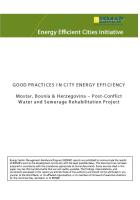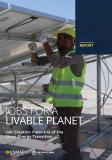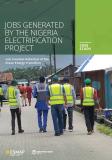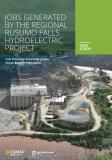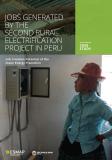Publications
Between 2000 and 2005, Mostar Water and Sewerage Utility (MWSU), a city-owned water and sewerage services provider in Mostar, Bosnia and Herzegovina, rehabilitated selected pumping stations and portions of distribution networks in a post-conflict environment. The challenges of project implementation were considerable following the civil war that had destroyed both the city’s infrastructure and its pre-war institutions. In the course of the project period, financial losses were turned into profits, collections of bills improved from 50 to 75 percent, water connections increased by 9 percent, and annual energy use was reduced by 40 percent.
Prior to the project, MWSU was a divided and war-damaged utility suffering large financial losses. The ethnic conflicts of 1992-1995 damaged several water treatment plants and reservoirs supplying suburban areas. The war led to the split of MWSU in two separate utilities: the Eastern utility serving the Bosniaks and the Western utility for the Croats. Both utilities collected, on average, less than 50 percent of their bills in 1998, and had a combined financial loss of KM2.3 million (US$1.3 million). Given this precarious financial position, and lack of government support, the utilities had to cancel necessary maintenance of their systems. Consequently, service deteriorated substantially with water leakages estimated at up to 80 percent of water produced.
In response, the Governments of Bosnia and Herzegovina and Mostar City decided to merge the two utilities and rehabilitate their systems. The Government mobilized a US$15.02 million capital investment fund to rehabilitate MWSU’s water and sewerage infrastructure. The fund financed replacement of several pumps at selected pumping stations, construction of gravity-fed transmission mains, rehabilitation of distribution networks, and implementation of an in-house active leakage detection program.
The project demonstrated that a public water and sewerage utility can effectively improve service quality, financial performance, and energy efficiency (EE) through rehabilitation in a post-conflict environment. With the experience gained from the project, MWSU received another US$8.9 million funding from the Global Environment Facility (GEF) for further improvements. The demonstration effect of this successful project motivated other utilities and ministries in Bosnia and Herzegovina to request MWSU assistance in managing donor-funded projects.
ESMAP. 2011. Good Practices in City Energy Efficiency: Mostar, Bosnia and Herzegovina - Post-Conflict Water and Sewerage Rehabilitation Project. ESMAP Energy Efficient Cities Initiative. Washington, DC: World Bank.
